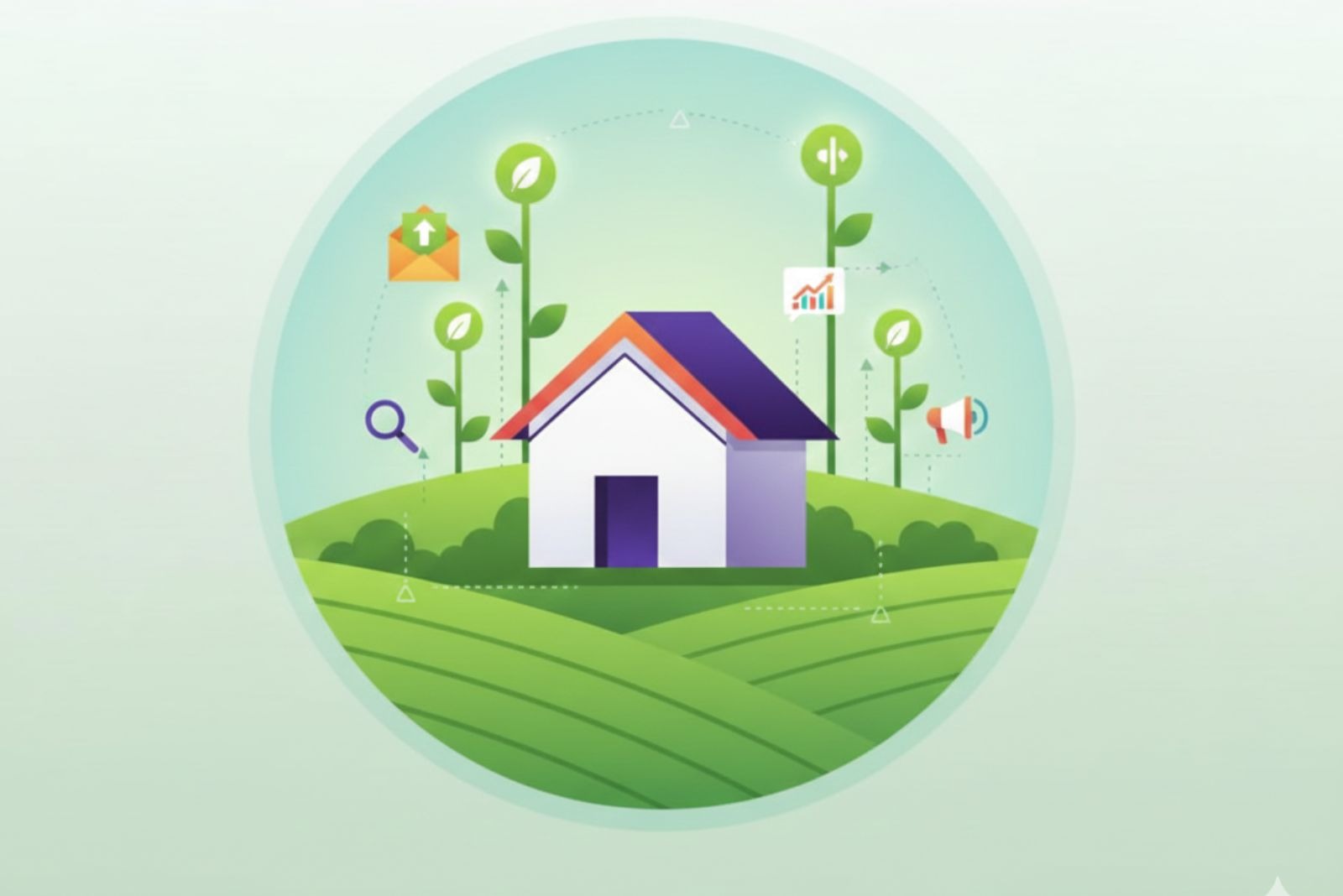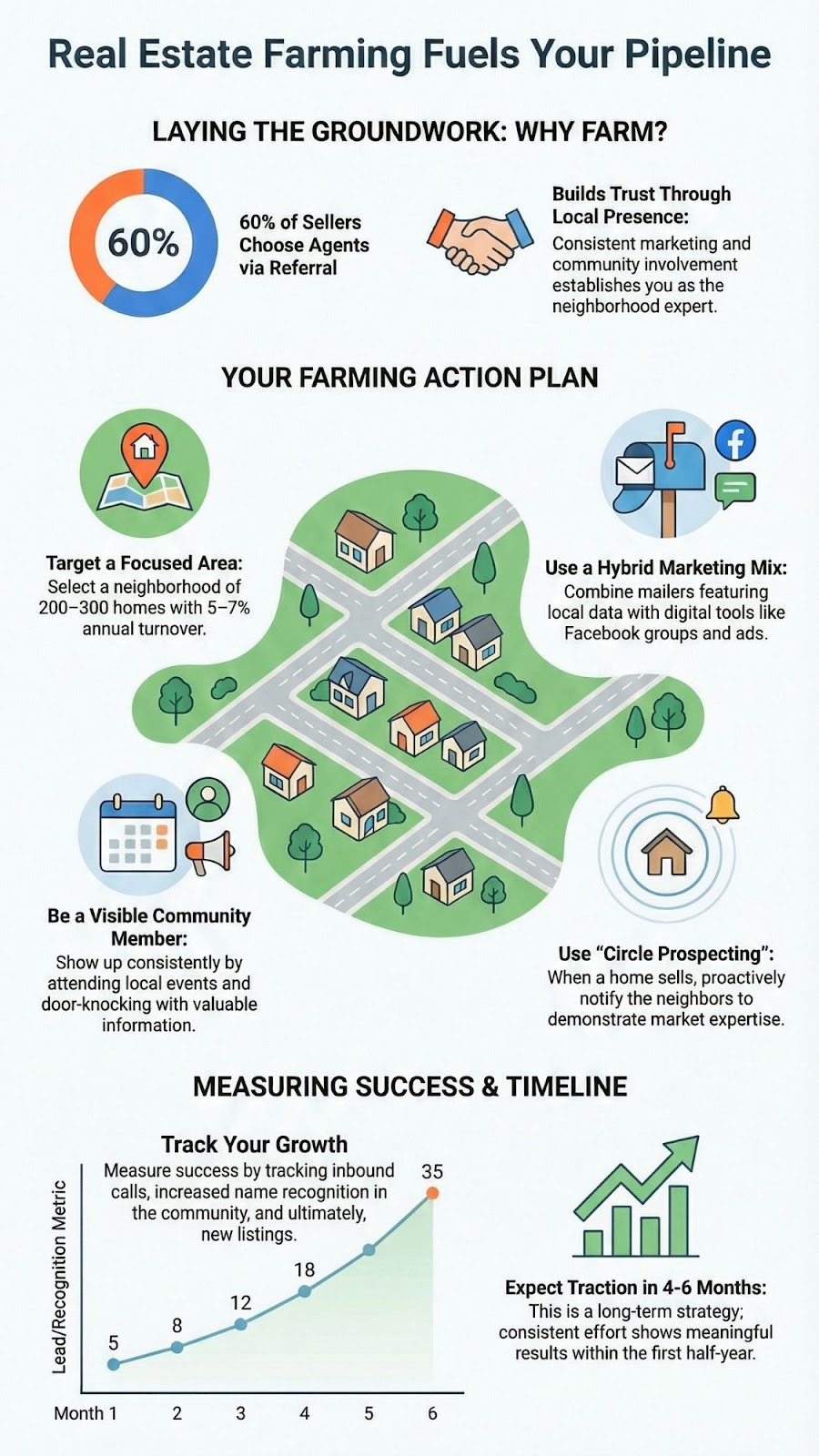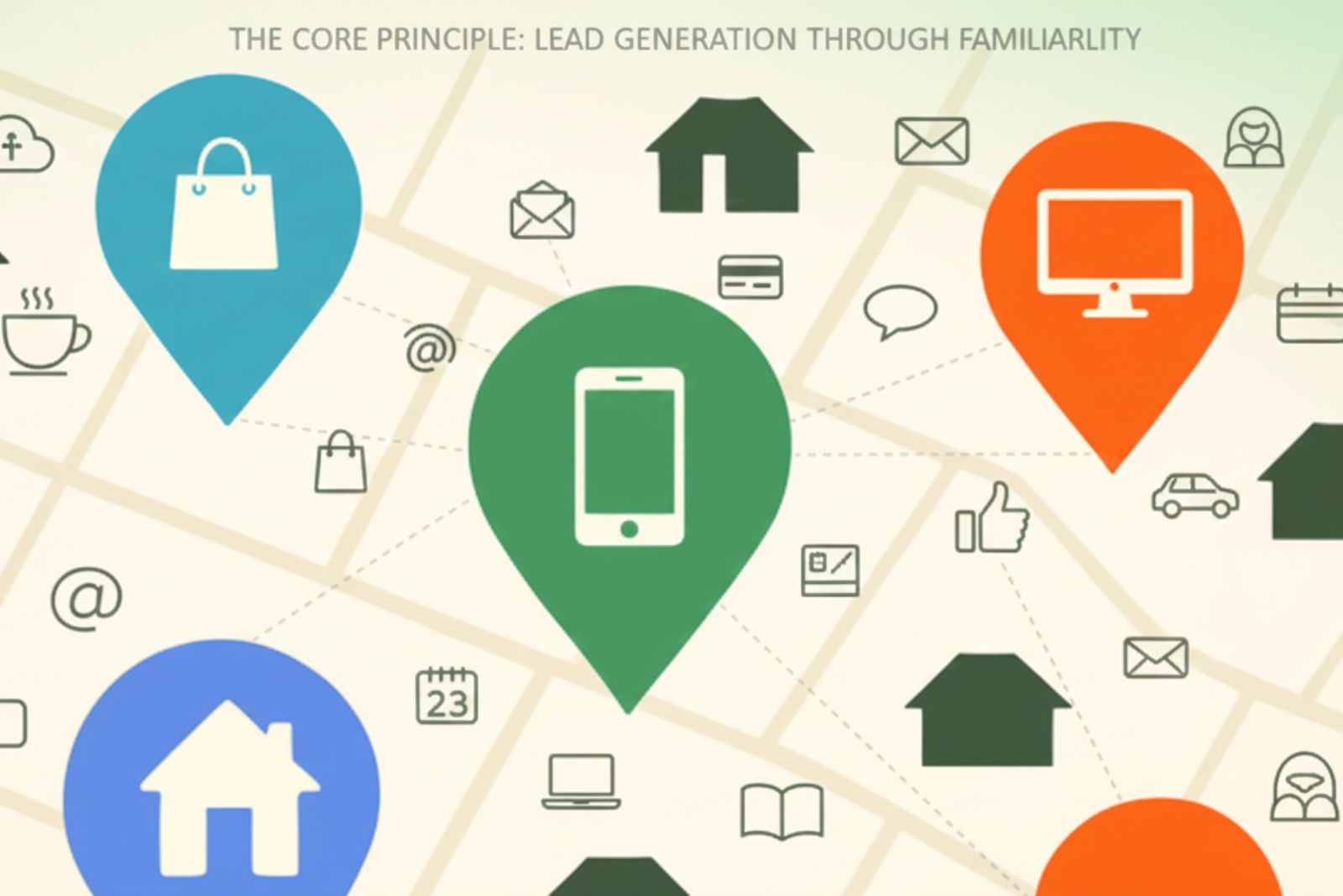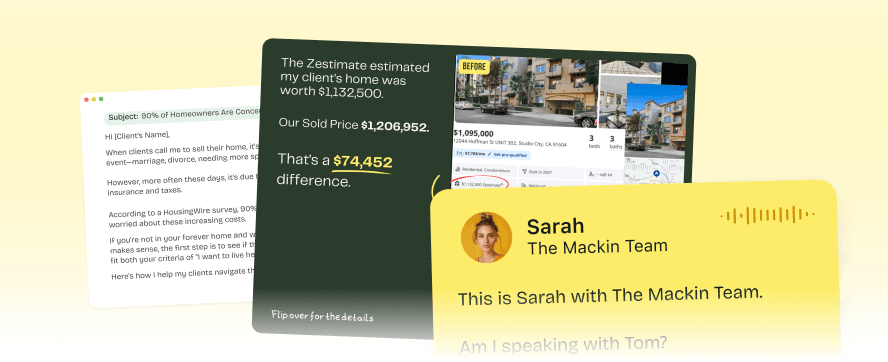
Real Estate Farming Fuels Your Pipeline Without Chasing Leads
The best agents don’t spread themselves thin. They choose one area, learn it inside and out, and become the obvious expert there. Over time, listings start coming to them.
You don’t need to pour money into random ads to create a predictable pipeline. The real lever is geographic real estate farming. The best agents don’t spread themselves thin. They choose one area, learn it inside and out, and become the obvious expert there. Over time, listings start coming to them.
It’s a deliberate way to claim a neighborhood,not loudly, not aggressively, but consistently. Done right, it shifts how people see you. You’re no longer just another agent. You’re the trusted local resource. Below is the framework that makes it work.
Key Takeaways
- Farming builds trust by making you a familiar presence, not a distant salesperson.
- Results come from steady effort over months, not quick bursts over days.
- The strongest farms combine traditional touchpoints with smart, hyperlocal digital tools.
The Quiet Power of Real Estate Farming

The postcard mentioned the exact sale price of a home two streets over. It included a short, handwritten-style note explaining what that sale might mean for values on our block.
It was signed by an agent whose name I’d been noticing lately,on a neighborhood Facebook group, on a banner at a little league game. I wasn’t planning to sell, but I kept the card. Months later, when a neighbor asked if I knew a good agent, that was the name that came to mind.
That’s the quiet power of real estate farming. It isn’t a big announcement. It’s a steady presence that builds recognition over time. You’re not throwing out a wide, weak net. You’re digging deep in one place and letting the roots grow.
What Real Estate Farming Really Means (And Why It Works)

Think of farming as choosing a territory, then serving it with care and relevance.
At its core, hyperlocal real estate marketing is about focus. You narrow your area, deliver real value, and build long-term recognition within one defined neighborhood.
- Pick a tight geographic area,a subdivision, condo building, or small neighborhood
- Focus on 200–300 homes you can realistically serve
- Learn the area deeply: prices, sales history, trends, and quirks
- Show up consistently with useful, local information
- Stay visible without being pushy
- Build trust through relevance and repetition
- Become the first name people think of when real estate comes up
This works because it cuts through noise. People are overwhelmed with ads and messages. A hyperlocal approach feels different. They see you at the store. They read your update about their street or school zone. You become a neighbor who knows real estate, not a salesperson chasing a zip code.
The Core Principle: Lead Generation Through Familiarity

So why pour your energy into one neighborhood? Because familiarity creates trust, and trust leads to referrals. Over 60% of sellers choose an agent because of a referral or prior experience (1).
Farming speeds that up. You can be referred before you’ve ever worked with someone directly, simply because your name feels known and your real estate lead follow-up strategies reinforce familiarity instead of pressure.
One agent worked a neighborhood for five months with no calls. In month six, she booked three listing appointments from homeowners who all said the same thing: “I see you everywhere around here.”
From Frantic Prospecting to Familiar Authority
“You must know this area better than anyone.”
That’s when her business shifted. Lead generation stopped feeling frantic and started feeling steady, creating more predictable growth in overall real estate GCI commission without increasing hours worked.
- Builds top-of-mind awareness
- Produces warmer, higher-quality leads
- Lowers acquisition costs over time
- Makes marketing more relevant and effective
Instead of shouting into a city of a million people, you’re having real conversations with a few hundred homeowners. The connection is stronger, and conversions follow.
A Blueprint for Growth: Farming Strategies That Work
Credits: Jimmy Mackin
Strong farm plans don’t rely on a single tactic. They’re built on a steady mix of touchpoints across channels. Here’s how effective agents do it.
Strategy 1: The Art of the Hyperlocal Mailer
Direct mail isn’t dead. Generic mail is. The difference is relevance, which is why the best campaigns to attract listings focus on street-level data instead of broad promises.
A vague postcard gets tossed.
The goal is to make your mail feel like an update from a knowledgeable neighbor.
- Use exact addresses, not broad claims
- Share real numbers,price, days on market, list-to-sale ratio
- Example: 123 Oak Lane sold in 12 days
- Connect that sale to nearby streets
- Explain how one sale affects neighborhood values
- Turn data into clear takeaways for homeowners
One agent in Texas includes a simple “What’s Your Home Worth?” tear-off card with a unique URL tied to each address.
Strategy 2: Becoming the Digital Mayor
Online, you can own the conversation. Create a Facebook group for your farm area,not a business page, but a real community space. Name it something local and specific.
Your role is to facilitate, not promote. Share updates on road work, lost pets, school news, or new restaurants. When people trust the group, they trust the person running it.
Strategy 3: The Ripple Effect of Circle Prospecting
When a home is listed or sold in your farm, you have a genuine reason to contact nearby neighbors. This isn’t a cold call. It’s relevant information about their biggest asset.
The goal isn’t to ask for business. It’s to share news and answer questions. That framing changes everything.
Strategy 4: Precision-Targeted Digital Ads
Stop boosting posts to everyone within 50 miles. Use Facebook and Instagram targeting to reach only the people who live in your farm area. You can narrow it down to a one-mile radius or even a single subdivision.
Your ad copy should feel unmistakably local.
Strategy 5: Local Content That Actually Connects
Skip generic “home buying tips.” Create content for your farm.
Film a drive-through tour of a specific subdivision. Host a live Q&A about the local school district. Interview the owner of a neighborhood café.
One agent in Seattle built a YouTube series highlighting local shops, parks, and waterfront spots. Almost her entire audience lived in or was moving to that area.
Strategy 6: The “Insider” List
People like access. Create an email or text list just for your farm with a clear promise: off-market alerts, early listing notices, and monthly neighborhood reports.
Then deliver on it. Share updates like, “Two homes on Cedar Avenue just went under contract off-market.” That kind of information keeps people paying attention.
Strategy 7: Farming Within Your Farm (FSBOs & Expireds)
Even within a focused area, you’ll find FSBOs and expired listings. These are strong opportunities because your local knowledge is your edge.
Your message shifts from “I’m an agent” to “I’m your neighborhood agent.” It’s helpful, not pushy, and grounded in relevance.
Strategy 8: The Power of Showing Up
Digital presence matters, but physical presence sticks. Attend local events,the garage sale, the holiday parade, the park cleanup. Talk to people. Be human.
One agent in Florida sponsors jerseys for a youth soccer team in her farm. That goodwill compounds. When those families think about moving, her name comes up first.
Strategy 9: The Lost Art of the Door Knock
It can feel uncomfortable, but in a farm, it works because it’s personal. The key is having a real reason.
Instead of “I’m your local agent,” try: “Hi, I’m Sam. I just listed the Johnson home down the street and wanted to let neighbors know. I also put together a short list of local landscapers.” It’s relevant, useful, and respectful.
Strategy 10: Claiming Your Spot on Google
This is where your farm starts working for you around the clock. Create dedicated pages for each neighborhood you serve. Not just city pages,specific ones.
Include school info, walkability, local favorites, and current and recent listings from that area. Write posts that answer local questions. Over time, these pages become long-term lead magnets.
Choosing Your Ground: How to Pick the Perfect Farm
Everything depends on choosing the right area. Don’t pick blindly. Look for neighborhoods with healthy turnover,around 5–7% annually (2). Use MLS data from the past two years to confirm activity.
Avoid areas completely dominated by a single agent unless you have a clear angle. And pick a place you actually like. If you care about the community, it shows.
Start small. Owning a 300-home area beats being invisible in a 3,000-home zone.
FAQs
What is real estate farming?
Real estate farming is the practice of focusing your marketing and relationship-building on one specific neighborhood. You learn the homes, prices, and people, then show up consistently with helpful information. Over time, residents recognize you and trust you. When they’re ready to move, they think of you first.
Why does real estate farming work?
It works because people trust what feels familiar. Repeated exposure builds comfort. You stop being a stranger and start feeling like the local expert. That trust leads to calls, referrals, and repeat business over time.
How many homes should I farm?
Most agents do best with 200–300 homes. That size is manageable and large enough to produce results. Too big, and you lose consistency. Too small, and opportunities are limited.
How long does real estate farming take to work?
Expect four to six months before seeing real traction. Early on, it can feel quiet. But people are paying attention. When momentum starts, it tends to build quickly. Consistency is what unlocks results.
What kind of mail should I send?
Send mail that’s specific and useful. Share recent sales from nearby streets, real prices, and clear explanations of what they mean. Avoid generic flyers. The goal is to inform, not hard-sell.
Should I use social media in my farm?
Yes. Social media helps maintain visibility between other touchpoints. Focus on community updates and local information. When you’re helpful and consistent, trust follows.
What is circle prospecting?
Circle prospecting is contacting neighbors after a nearby home is listed or sold. You’re sharing relevant information, not pitching services. Because the news is timely and local, conversations feel natural.
Can new agents do real estate farming?
Absolutely. New agents often do very well with farming because it rewards focus and consistency, not massive budgets. Share what you’re learning, stay honest, and keep showing up.
How much does real estate farming cost?
Costs vary, but direct mail is usually the biggest expense. Many agents start small with quarterly mailings. Social media and local events can be low-cost. What matters most is choosing a budget you can sustain.
How do I know if my farm is working?
You’ll notice people recognizing your name. They’ll mention your postcards or posts. Calls and questions start coming in. Awareness comes first, then listings. Track both.
Your Path to Becoming the Local Expert
Real estate farming isn’t a tactic. It’s a long-term choice to go deep instead of wide. You may not see results right away. Then, suddenly, things shift,one listing turns into referrals, and momentum builds.
Top agents understand this. They don’t chase every new lead-gen trend. They stay patient, consistent, and rooted in their farm. Every mailer, post, and conversation plants trust.
Your neighborhood is waiting. Start planting today with ListingLeads.
References
- https://www.researchgate.net/publication/248386679
- https://www.researchgate.net/publication/233055591
Related Articles

You’re about to make a really smart decision.
ListingLeads.com is your go-to source for all the marketing and sales campaigns you need to attract more listings. Join more than 3,000 agents and get instant access to 285+ proven listing attraction campaigns.

